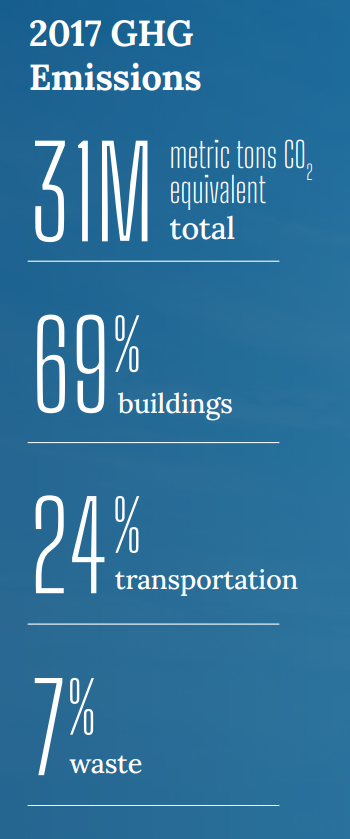Electrify Chicago
An independent tool for viewing City of Chicago building data
According to the
2022 Chicago Climate Action Plan,
69% of Chicago's emissions come from buildings, making
building emissions our biggest challenge and our biggest opportunity as a city
to tackle climate change. At Electrify Chicago, we showcase building performance using
publicly available data supplemented by community-submitted photographs and building
owners.
Start by looking at Chicago's buildings with the highest greenhouse gas intensity i.e. emissions per square foot. Large, efficient, buildings can perform much better than very inefficient small buildings on this metric.
New Article
📰 $30 Million In Missed Fines
The City Of Chicago failed to collect $30 million in potential fines from the building benchmarking ordinance, reducing transparency and accountability.
Legislative update! 🎉
As of late January 2024, legislation is being introduced to require new use more efficient forms of water and space heating, via the Clean And Affordable Buildings Ordinance (CABO), which will reduce the number of highly polluting and inefficient buildings that end up on this site.
If you're in Chicago,
write to your alderman to support the CABO!
Chicago Buildings by Greenhouse Gas Intensity
Note: Data includes large Chicago buildings with data from 2022, unless explicitly stated otherwise.
Note: This data only includes buildings whose emissions are reported
under the
Chicago Energy Benchmarking Ordinance. According to the City “As of 2016,
this list includes all commercial, institutional, and residential buildings larger than
50,000 square feet.” This dataset is also then filtered to only buildings with
reported emissions > 1,000 metric tons CO2 equivalent.
The latest year of data is from 2022, but we update the site regularly when new data is available, and some buildings may have failed to report that year, and only have older data available.
| Property Name / address | Primary Property Type |
Greenhouse Gas Intensity (kg CO2 eq./sqft) |
Total Greenhouse Emissions (metric tons CO2 eq.) |
|---|---|---|---|
|
Institute of Cultural Affairs
4750 N Sheridan Rd
| Office | 5.0 kg/sqft
Lowest 25%
| 916 tons
Highest 48%
|
|
USG Building
550 W Adams
| Office | 5.0 kg/sqft
Lowest 25%
| 2,620 tons
Highest 17%
|
|
The Franklin
🚩
227 W Monroe
| Office | 5.0 kg/sqft
Lowest 25%
| 14,830 tons #32 Highest
|
|
5034 5040 S WOODLAWN AVE
5034 5040 S WOODLAWN AVE
| Multifamily Housing | 5.0 kg/sqft
Lowest 25%
| 307 tons
Lowest 9%
|
|
1200 E 78TH ST
1200 E 78TH ST
| Multifamily Housing | 5.0 kg/sqft
Lowest 25%
| 465 tons
Lowest 23%
|
|
3750 S COTTAGE GROVE AVE
3750 S COTTAGE GROVE AVE
| Multifamily Housing | 5.0 kg/sqft
Lowest 25%
| 377 tons
Lowest 15%
|
|
New Englewood Terrace Apartments
6425 S Lowe
| Multifamily Housing | 5.0 kg/sqft
Lowest 25%
| 1,632 tons
Highest 29%
|
|
23 W CHICAGO AVE
23 W CHICAGO AVE
| Multifamily Housing | 4.9 kg/sqft
Lowest 23%
| 4,905 tons
Highest 7%
|
|
William Howard Taft High School - Academy
4071 N Oak Park Ave
| K-12 School | 4.9 kg/sqft
Lowest 23%
| 656 tons
Lowest 38%
|
|
Midpointe Apartments
4050 West 115th Street
| Multifamily Housing | 4.9 kg/sqft
Lowest 23%
| 1,948 tons
Highest 24%
|
|
Wicker Park Connection
1640 W Division St
| Multifamily Housing | 4.9 kg/sqft
Lowest 23%
| 728 tons
Lowest 42%
|
|
505 N. Green St.
🕰️
505 N GREEN ST
| Multifamily Housing | 4.9 kg/sqft | 271 tons |
|
Homewood Suites by Hampton Inn
118 N JEFFERSON ST
| Hotel | 4.9 kg/sqft
Lowest 23%
| 1,617 tons
Highest 29%
|
|
Columbus on the Park Condominium
🕰️
811 S Lytle
| Multifamily Housing | 4.9 kg/sqft | 958 tons |
|
Clinton Complex Condominium Association
📷
500 S Clinton St
| Multifamily Housing | 4.9 kg/sqft
Lowest 23%
| 1,634 tons
Highest 29%
|
Data Source:
Chicago Energy Benchmarking Data
